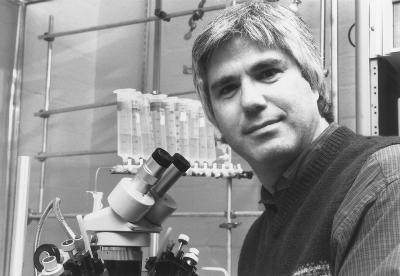November 4, 2004
Charles Chavkin named to hold Treuer Endowed Chair
Allan Treuer, retired owner of the North Star Ice Equipment Co. and an active philanthropist in the Northwest, has made a major gift to the UW to establish the Allan and Phyllis Treuer Chair in Pain Research. Dr. Charles Chavkin, UW professor of pharmacology, has been selected as the first holder of the Treuer Chair.
Allan Treuer was born in St. Louis but moved to Seattle with his family as an infant, attended Broadway High School, and graduated from the UW in 1936 with a major in history. After distinguished service in the infantry in World War II, he joined the Northstar Ice Equipment Company and led its expansion from a fledgling local organization to a worldwide leader in its commercial area. He and his late wife Phyllis established the Treuer Chair in Pain Research to advance research on the basic neurobiology and pathophysiology of chronic pain, in order to provide the scientific basis for development of new therapies to prevent and treat this widespread, debilitating clinical condition.
Chavkin’s research focuses on the effects of the opiate drugs used clinically to control pain. The nervous system produces natural opoid peptides that act at the same receptor molecules in brain neurons as the analgesic opiate morphine. These opioid peptides and their receptors are important in receiving, transmitting, and processing pain information in the nervous system, and morphine and related drugs are the most important therapeutic agents for intense pain.
As a graduate student in pharmacology at Stanford with Professor Avram Goldstein in pharmacology, Chavkin was part of the research team that discovered an exceptionally potent endogenous opioid called dynorphin that selectively activates kappa opiate receptors, one of three types of receptors in the brain for opioid peptides. Chavkin followed up this seminal work as a postdoctoral fellow with Professor Floyd Bloom at the Scripps Research Institute by analyzing the mechanisms by which opioid peptides act as neurotransmitters in the hippocampus, a brain region important for information processing, learning, and memory.
In his laboratory in the UW Department of Pharmacology, Chavkin has built an internationally recognized research program on the function of the endogenous opiate system in the brain. He has discovered important new aspects of the mechanism of tolerance, the process by which patients become insensitive to morphine and other opiate drugs in chronic therapy. Tolerance requires use of ever-increasing doses of opiate drugs for pain control, and can lead to addiction to pain medications.
Chavkin also studies the neurobiological causes of addiction to opiates like heroin. By studying addiction in normal and genetically altered mice, he and his colleagues hope to understand the biological basis for tolerance and addiction to these drugs.
Chavkin’s research as Treuer Chair will advance understanding of the basic mechanisms of opiate action in drug addiction and in pain sensation and processing. New fundamental knowledge could lead to more effective use of opiate drugs in pain therapy and contribute to prevention and treatment of drug abuse.
In addition to his research activities, Chavkin serves as director of the UW Center for Drug Addiction Research and associate director of the Alcohol and Drug Abuse Institute. He is past-president of the International Narcotics Research Conference, a leading society of narcotics researchers. He also heads an NIH-funded training program for graduate students in Molecular Pharmacology of Abused Drugs, and he chairs and teaches in the Human Biology course on Neuropharmacology for medical students. He joined the UW faculty in 1985.



